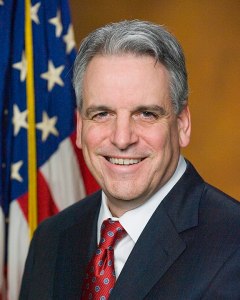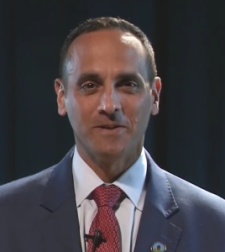
Retired Vermont State Police Sgt. Jay Wiggen
Among the most toxic behaviors that we often see in police officers is the tendency of some of them to overreact if they think they’re being disrespected. What they deserve, as public servants doing a difficult and dangerous job, is our cooperation. That doesn’t mean we have to like it.
 Which brings us to Sgt. Jay Riggen, a Vermont state trooper. According to a recent account in The New York Times, in February 2018 Riggen pulled over a driver named Gregory Bombard — twice — for giving him the finger. Bombard denied it, but then did, in fact, flip off Riggen and cursed. Bombard was arrested and charged with two counts of disorderly conduct, charges that were later dismissed.
Which brings us to Sgt. Jay Riggen, a Vermont state trooper. According to a recent account in The New York Times, in February 2018 Riggen pulled over a driver named Gregory Bombard — twice — for giving him the finger. Bombard denied it, but then did, in fact, flip off Riggen and cursed. Bombard was arrested and charged with two counts of disorderly conduct, charges that were later dismissed.
It got worse. The Times story, by Sara Ruberg continues:
According to the lawsuit, which was filed in 2021, the police circulated Mr. Bombard’s mug shot to local news outlets after his arrest and towed his car from where he had pulled over. Lawyers representing him said that last Christmas the state police issued another citation ordering him to be arraigned on a disorderly conduct charge in connection with the 2018 episode after the dashcam footage of his arrest was circulated and the police received public pushback.
Bombard last month received a $175,000 settlement. And Riggen, who retired at the end of May, is receiving a New England Muzzle Award.
An account by
In the ensuing conversation, Riggen acknowledged that he might have mistaken Bombard lighting a cigarette for the obscene hand gesture. FIRE [the Foundation for Individual Rights and Expression] made the dash cam footage of the arrest public late last year.
In his response to Bombard’s lawsuit, Riggen admitted that he told Bombard: “Once I realized that you weren’t flipping me off, you’re free to go.”
As Bombard pulled out to leave, however, he cursed and displayed his middle finger, according to the civil complaint.
In the dash cam video, Riggen can be heard saying: “He called me an asshole and said ‘Fuck you.’ Flipped the bird. I’m gonna arrest him for disorderly conduct.”
Bombard sued with the help of the Vermont ACLU and FIRE. As FIRE senior attorney Jay Diaz put it in a statement: “We wouldn’t tolerate police officers who don’t understand traffic laws or parking laws. Well, the Constitution is the highest law in the land, and it doesn’t allow cops to abuse their power to punish protected speech.”
Now, admittedly, Bombard’s response to Riggen was not exactly the smartest thing he could have done. But it was protected by the First Amendment, and Riggen should have acted accordingly instead of punishing Bombard for failing to show him the respect his mistakenly thought he was entitled to.


 I’ve been following this case for more than a year because of its absurdity. The state attorney general’s office says that Paul broke the law on several occasions by publishing ads for local candidates and warrant articles in two weekly newspapers that she owned, the Londonderry Times and the Nutfield News, the latter of which has stopped publishing. It seems to me that someone — maybe the state legislature, which could correct this travesty — deserves a New England Muzzle Award. Two reasons:
I’ve been following this case for more than a year because of its absurdity. The state attorney general’s office says that Paul broke the law on several occasions by publishing ads for local candidates and warrant articles in two weekly newspapers that she owned, the Londonderry Times and the Nutfield News, the latter of which has stopped publishing. It seems to me that someone — maybe the state legislature, which could correct this travesty — deserves a New England Muzzle Award. Two reasons:



